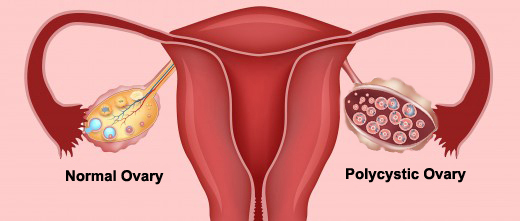
Understanding What is Polycystic Ovary Syndrome (PCOS)?
Polycystic ovary syndrome, also commonly referred to as PCOS is an endocrine disorder that afflicts women. Patients who are suffering from this condition typically have ovaries that are bigger than ordinary. This condition is also characterized by an imbalance in female sex hormones and particularly high levels of either insulin or male hormones or both.
It is estimated that 12-18 percent of women are afflicted with PCOS. Of this figure, 70 percent are not diagnosed and not given any form of treatment.
It is important to remember that PCOS is not a communicable disease. In fact, many experts around the world believe that this condition is hereditary. Ordinarily, though, PCOS can be diagnosed through different ways, including looking at your family history, as well as doing blood tests, physical examination and pelvic ultrasound and/or various other small tests.
(PCOS) Polycystic Ovary Syndrome Symptoms in Pregnancy.
How do you know if you are suffering from PCOS polycystic ovary syndrome? There are a number of symptoms associated with PCOS disorder. Some of the most usual ones include any or all of the following:
1. Irregular menstrual period
Instead of having your monthly period, you may suffer with irregular monthly menstruation. There are usually two kinds of irregular period: the first is called amenorrhea, where a woman doesn’t menstruate at all. The second kind is called oligomenorrhea, in this woman only have few menstrual periods.
2. Unhealthy weight gain
Many women who are suffering from PCOS also suffer from obesity.
3. Excessive acne and hair growth
Acne and unwanted hair growth occur due to chemical imbalance and the uneven surge of hormones in your body. Abnormally high testosterone levels also associated for unwanted hair growth for example, can result in the growth of excessive body hair on the section on top of your upper lip, your legs, and your back.
4. Infertility
A huge number of women suffering from PCOS also experience problem with infertility. This is brought about by the irregular, sometimes nonexistent, menstrual cycles.
PCOS can be managed and treated using a variety of mechanisms designed to address some of the symptoms. For example, taking in oral contraceptive pills is meant to facilitate regular menstruation. This is also helpful in reducing acnes.
Other oral medications include those that are prescribed by your doctor to reduce the levels of insulin in your body. But Most importantly, is that you need to maintain an active and healthy lifestyle. Modifications in the way you live can make a huge difference in your battle against PCOS. If you are overweight be cautious of the food that you take in and schedule for regular exercises atleast 3 days a week 2hr.
In the end, treating and managing PCOS negates commitment from your end to stick to healthy living habits no matter what. Otherwise, a multidisciplinary approach that involves dietitians, gynaecologists, and endocrinologists is going to be your best bet to treat PCOS.
Leave a Reply